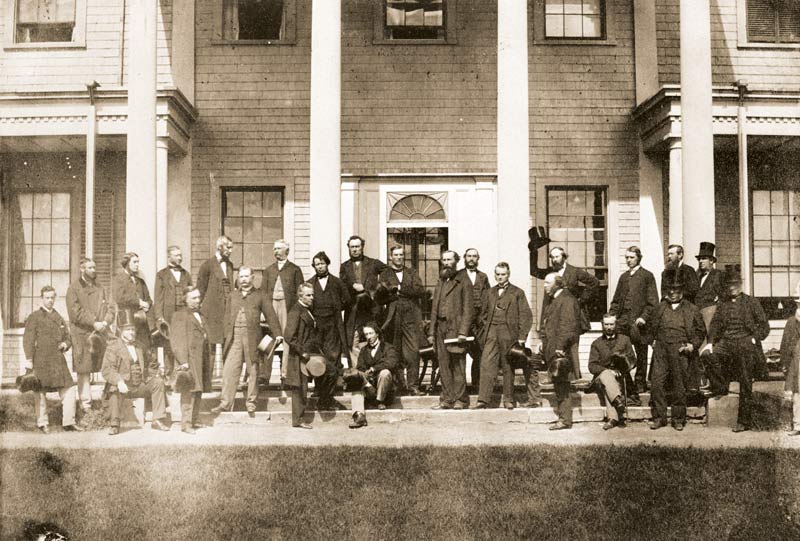
Delegates from the legislatures of Canada, New Brunswick, Nova Scotia and Prince Edward Island at the Charlottetown Conference. [George P. Roberts/LAC/C-000733]
The 1864 Charlottetown Conference was initially designed to discuss a union of the three Maritime provinces. But delegates from the Province of Canada heard about the conference and decided to crash the party.
The meeting brought together strange political bedfellows and fiercely opposing viewpoints in an effort to create a country. George Brown, a morally upright Liberal who accused John A. Macdonald of being a corruptionist and disliked French Canadianism and its champion, George-Étienne Cartier, agreed to ally with his nemeses for the grand enterprise of Confederation. Another pivotal figure was D’Arcy McGee, a former revolutionary, and an alcoholic who was considered the country’s greatest orator. They travelled to Charlottetown on the same steamer, Queen Victoria. Luckily, there was $13,000 worth of champagne on board.
They had expected a grand welcome from their Maritime hosts, but when the ship arrived, the harbour was deserted. Everyone was under the tent that held Slaymaker’s and Nichol’s Olympic Circus, the first to visit the island in 20 years.
The political meetings turned into something of a circus as well, with long speeches, lobster dinners, champagne toasts, debates and dances. The maritime leaders weren’t all in favour of uniting the colonies.
But there was a persuasive argument to be made. Britain was tiring of the expense of the territory and, to the south, the U.S. had put together a massive army. What if those troops were turned north? The best defense was in sticking together.
On Sept. 3, there was a champagne lunch aboard Queen Victoria for the delegates. Historian Peter Waite suggested that this was the precise moment of the birth of Confederation. Someone invoked the words from the Anglican wedding ceremony: If anyone knows any reason why the provinces should not be united in matrimony, let him speak now or forever hold his peace.
There was laughter, but no objections. There were endless negotiations to come, but this was the unofficial beginning of the Dominion of Canada. Historian J.M.S. Careless wrote, “Other states might have a more dramatic start—but few, surely, a more enjoyable one.”
During the week, Macdonald spoke eloquently about the benefits of union. Brown talked about the legal infrastructure (something Macdonald would end up being the architect of).McGee, who was also a poet, talked about national identity, one that would be celebrated and defined by a robust literature. Alexander Galt, Upper Canada’s finance minister, talked about the financial machinery of the new nation.
On Sept. 8, a grand ball was held in Province House, with the legislative assembly turned into a dance floor and the library converted to a bar. Dinner was served at 1 a.m.
and the speeches went on until 5 a.m. A few hours later, delegates staggered back onto Queen Victoria and it was on to Halifax for another party—down several cases of champagne and one step closer to a country.
Advertisement


















